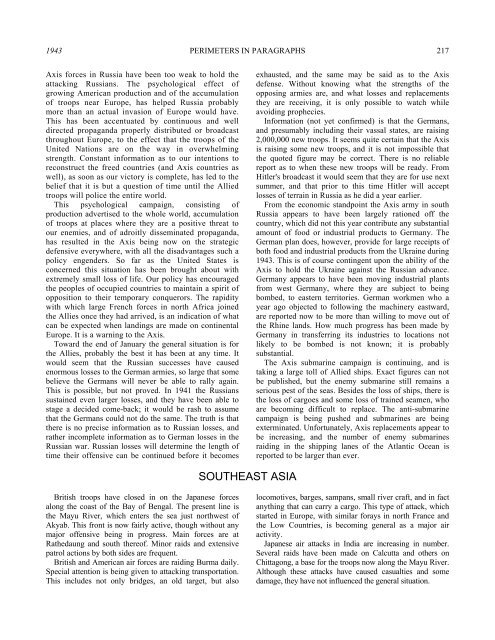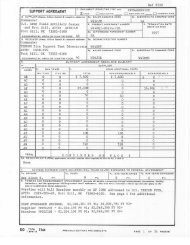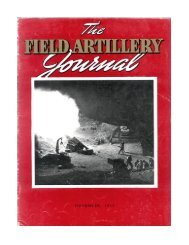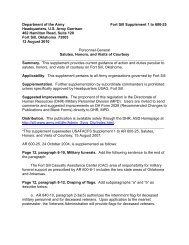the field artillery journal - Fort Sill - U.S. Army
the field artillery journal - Fort Sill - U.S. Army
the field artillery journal - Fort Sill - U.S. Army
Create successful ePaper yourself
Turn your PDF publications into a flip-book with our unique Google optimized e-Paper software.
1943 PERIMETERS IN PARAGRAPHS 217<br />
Axis forces in Russia have been too weak to hold <strong>the</strong><br />
attacking Russians. The psychological effect of<br />
growing American production and of <strong>the</strong> accumulation<br />
of troops near Europe, has helped Russia probably<br />
more than an actual invasion of Europe would have.<br />
This has been accentuated by continuous and well<br />
directed propaganda properly distributed or broadcast<br />
throughout Europe, to <strong>the</strong> effect that <strong>the</strong> troops of <strong>the</strong><br />
United Nations are on <strong>the</strong> way in overwhelming<br />
strength. Constant information as to our intentions to<br />
reconstruct <strong>the</strong> freed countries (and Axis countries as<br />
well), as soon as our victory is complete, has led to <strong>the</strong><br />
belief that it is but a question of time until <strong>the</strong> Allied<br />
troops will police <strong>the</strong> entire world.<br />
This psychological campaign, consisting of<br />
production advertised to <strong>the</strong> whole world, accumulation<br />
of troops at places where <strong>the</strong>y are a positive threat to<br />
our enemies, and of adroitly disseminated propaganda,<br />
has resulted in <strong>the</strong> Axis being now on <strong>the</strong> strategic<br />
defensive everywhere, with all <strong>the</strong> disadvantages such a<br />
policy engenders. So far as <strong>the</strong> United States is<br />
concerned this situation has been brought about with<br />
extremely small loss of life. Our policy has encouraged<br />
<strong>the</strong> peoples of occupied countries to maintain a spirit of<br />
opposition to <strong>the</strong>ir temporary conquerors. The rapidity<br />
with which large French forces in north Africa joined<br />
<strong>the</strong> Allies once <strong>the</strong>y had arrived, is an indication of what<br />
can be expected when landings are made on continental<br />
Europe. It is a warning to <strong>the</strong> Axis.<br />
Toward <strong>the</strong> end of January <strong>the</strong> general situation is for<br />
<strong>the</strong> Allies, probably <strong>the</strong> best it has been at any time. It<br />
would seem that <strong>the</strong> Russian successes have caused<br />
enormous losses to <strong>the</strong> German armies, so large that some<br />
believe <strong>the</strong> Germans will never be able to rally again.<br />
This is possible, but not proved. In 1941 <strong>the</strong> Russians<br />
sustained even larger losses, and <strong>the</strong>y have been able to<br />
stage a decided come-back; it would be rash to assume<br />
that <strong>the</strong> Germans could not do <strong>the</strong> same. The truth is that<br />
<strong>the</strong>re is no precise information as to Russian losses, and<br />
ra<strong>the</strong>r incomplete information as to German losses in <strong>the</strong><br />
Russian war. Russian losses will determine <strong>the</strong> length of<br />
time <strong>the</strong>ir offensive can be continued before it becomes<br />
British troops have closed in on <strong>the</strong> Japanese forces<br />
along <strong>the</strong> coast of <strong>the</strong> Bay of Bengal. The present line is<br />
<strong>the</strong> Mayu River, which enters <strong>the</strong> sea just northwest of<br />
Akyab. This front is now fairly active, though without any<br />
major offensive being in progress. Main forces are at<br />
Ra<strong>the</strong>daung and south <strong>the</strong>reof. Minor raids and extensive<br />
patrol actions by both sides are frequent.<br />
British and American air forces are raiding Burma daily.<br />
Special attention is being given to attacking transportation.<br />
This includes not only bridges, an old target, but also<br />
SOUTHEAST ASIA<br />
exhausted, and <strong>the</strong> same may be said as to <strong>the</strong> Axis<br />
defense. Without knowing what <strong>the</strong> strengths of <strong>the</strong><br />
opposing armies are, and what losses and replacements<br />
<strong>the</strong>y are receiving, it is only possible to watch while<br />
avoiding prophecies.<br />
Information (not yet confirmed) is that <strong>the</strong> Germans,<br />
and presumably including <strong>the</strong>ir vassal states, are raising<br />
2,000,000 new troops. It seems quite certain that <strong>the</strong> Axis<br />
is raising some new troops, and it is not impossible that<br />
<strong>the</strong> quoted figure may be correct. There is no reliable<br />
report as to when <strong>the</strong>se new troops will be ready. From<br />
Hitler's broadcast it would seem that <strong>the</strong>y are for use next<br />
summer, and that prior to this time Hitler will accept<br />
losses of terrain in Russia as he did a year earlier.<br />
From <strong>the</strong> economic standpoint <strong>the</strong> Axis army in south<br />
Russia appears to have been largely rationed off <strong>the</strong><br />
country, which did not this year contribute any substantial<br />
amount of food or industrial products to Germany. The<br />
German plan does, however, provide for large receipts of<br />
both food and industrial products from <strong>the</strong> Ukraine during<br />
1943. This is of course contingent upon <strong>the</strong> ability of <strong>the</strong><br />
Axis to hold <strong>the</strong> Ukraine against <strong>the</strong> Russian advance.<br />
Germany appears to have been moving industrial plants<br />
from west Germany, where <strong>the</strong>y are subject to being<br />
bombed, to eastern territories. German workmen who a<br />
year ago objected to following <strong>the</strong> machinery eastward,<br />
are reported now to be more than willing to move out of<br />
<strong>the</strong> Rhine lands. How much progress has been made by<br />
Germany in transferring its industries to locations not<br />
likely to be bombed is not known; it is probably<br />
substantial.<br />
The Axis submarine campaign is continuing, and is<br />
taking a large toll of Allied ships. Exact figures can not<br />
be published, but <strong>the</strong> enemy submarine still remains a<br />
serious pest of <strong>the</strong> seas. Besides <strong>the</strong> loss of ships, <strong>the</strong>re is<br />
<strong>the</strong> loss of cargoes and some loss of trained seamen, who<br />
are becoming difficult to replace. The anti-submarine<br />
campaign is being pushed and submarines are being<br />
exterminated. Unfortunately, Axis replacements appear to<br />
be increasing, and <strong>the</strong> number of enemy submarines<br />
raiding in <strong>the</strong> shipping lanes of <strong>the</strong> Atlantic Ocean is<br />
reported to be larger than ever.<br />
locomotives, barges, sampans, small river craft, and in fact<br />
anything that can carry a cargo. This type of attack, which<br />
started in Europe, with similar forays in north France and<br />
<strong>the</strong> Low Countries, is becoming general as a major air<br />
activity.<br />
Japanese air attacks in India are increasing in number.<br />
Several raids have been made on Calcutta and o<strong>the</strong>rs on<br />
Chittagong, a base for <strong>the</strong> troops now along <strong>the</strong> Mayu River.<br />
Although <strong>the</strong>se attacks have caused casualties and some<br />
damage, <strong>the</strong>y have not influenced <strong>the</strong> general situation.

















